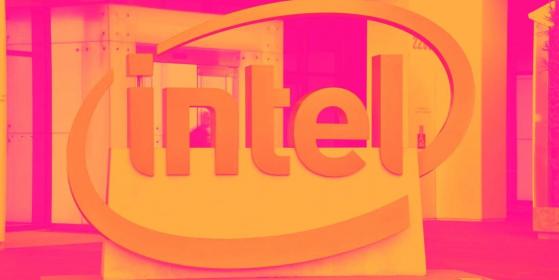What Happened: Shares of computer processor maker Intel (NASDAQ:INTC) fell 7.4% in the afternoon session after the company announced a new financial reporting structure, which revealed wider-than-expected losses in its Foundry business. According to the press release, The newly established Foundry segment recorded operating losses of $7 billion in 2023, while sales clocked in at $18.9 billion. This meant profit margins were worse compared to 2022 when it recorded operating losses of $5.2 billion on $27.5 billion in sales. The company expects operating losses to peak in 2024, alongside expectations for breakeven operating margins before the end of 2030.
Also, Intel provided long-term growth and profitability projections. CFO Dave Zinsner added, "This model is designed to unlock significant cost savings, operational efficiencies, and asset value. As it begins to take hold, we expect to accelerate on our path toward achieving our ambition of 60% non-GAAP gross margins and 40% non-GAAP operating margins in 2030."
Lastly, Intel announced the appointment of Lorenzo Flores as Chief Financial Officer of Intel Foundry, effective April 8, 2024.
The stock market overreacts to news, and big price drops can present good opportunities to buy high-quality stocks. Is now the time to buy Intel? Find out by reading the original article on StockStory.
What is the market telling us: Intel's shares are not very volatile than the market average and over the last year have had only 11 moves greater than 5%.
The previous big move we wrote about was 29 days ago, when the company dropped 5.1% as stocks declined, with investors likely taking profits. The Nasdaq fell 1.6%, while the S&P 500 was down 0.9%. Some of the big tech names felt the heat, with Tesla (NASDAQ:TSLA), Netflix (NASDAQ:NFLX), and Microsoft (NASDAQ:MSFT) all declining by more than 2%. Notably, iPhone manufacturer Apple (NASDAQ:AAPL) was also down nearly 3% following a research report by Counterpoint that suggested a decline in iPhone sales in China in the first six weeks of the year. The weak demand report could signal that the purchasing power of consumers in the region is weakening. Otherwise, we have found no other fundamental or rate-related reasons explaining the broad market decline.
The week was packed with information for investors to digest. Fed Chair Jerome Powell was expected to give updates to Congress on March 6th and 7th, 2024, about the current monetary outlook, recent policy actions, and progress toward bringing inflation back down.
Finally, on March 8th, the Bureau of Labor Statistics reported nonfarm payrolls for the month of February.
The insight gleaned from the economic data and updates during the week likely informed the market's outlook on equities and other assets. Investors expect the Fed to begin cutting rates this year, with the expectation of the first rate cut as early as the first half of the year.
As a reminder, the driver of a stock's value is the sum of its future cash flows discounted back to today. With lower interest rates, investors can apply higher valuations to their stocks. No wonder so many in the investment community are optimistic about 2024. We at StockStory remain cautious, as following the crowd can lead to adverse outcomes. During times like this, it's best to own high-quality, cash-flowing companies that can weather the ups and downs of the market.
Intel is down 14.6% since the beginning of the year, and at $40.82 per share it is trading 19.6% below its 52-week high of $50.76 from December 2023. Investors who bought $1,000 worth of Intel's shares 5 years ago would now be looking at an investment worth $735.49.
